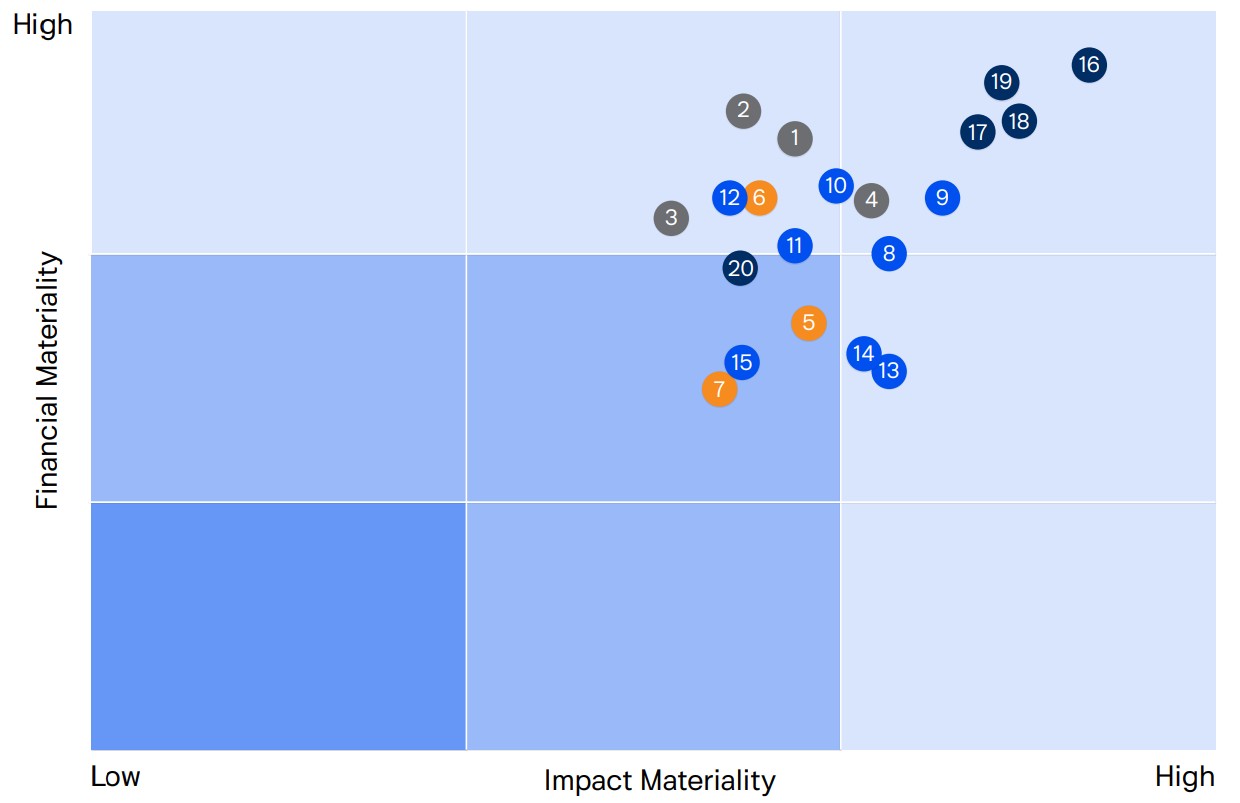| Business Case |
A strong governance structure supports business growth by enhancing accountability and transparency, fostering trust among stakeholders, ensuring legal and regulatory compliance, and aiding strategic decision-making to respond effectively to changes. The Bank shall ensure that its Board of Directors is well equipped with a wide range of experiences, skills, knowledge and gender to facilitate the decision-making process. |
The Bank manages indirect environmental and social impacts from our business operations through responsible lending and sustainable finance. It recognizes that certain transactions and client engagements could result in indirect financial risks, such as environmental and social risks. The incidents of negative socio-environmental impacts can be a significant source of reputational risk, which can lead to a decrease in asset value or even losses to the Bank. Although the E&S risks may not pose an immediate impact to the Bank, it undermines our long-term sustainability. |
The Bank is a data-driven organization. Its operations are based on data analysis and insights. The collection of data plays a vital role in the Bank’s day-to-day activities while catering to customers. It is our responsibility to manage customer data in a way that fosters trust and mitigates any potential risks that may jeopardize the customers’ financial well-being, privacy, and rights. |
| Business Impact |
Risk management |
Risk management |
Risk management |
| Business Strategies |
The Bank has a robust corporate governance framework and processes designed to secure a competitive edge for long-term business growth while ensuring value creation for all stakeholder groups. The Bank’s Corporate Governance Policy is standardized and includes best practices guided by the Bank of Thailand, the Securities and Exchange Commission of Thailand, the Organization for Economic Co-operation and Development (OECD), and the ASEAN Corporate Governance Scorecard. Its Board of Directors is composed of individuals with diverse skills, experiences, and backgrounds, offering valuable insights into the decision-making process. The Board undergoes an annual assessment to ensure board effectiveness. The Bank has dedicated sub-committees that are drawn on the professional expertise of their members to oversee and govern critical aspects of the Bank's operations. |
The Bank has incorporated the underlying environmental and social issues into the Environmental and Social Responsibility (ESR) Policy which is applicable to corporate, SMEs, retail clients, and its investment portfolios. An exclusion list is established to screen out business activities associated with high E&S risks and impacts. The screenings of E&S risks are applicable in terms of general and sector-specific E&S risk assessments. The Bank has defined a long-term commitment to manage impacts from our lending business, including reducing coal-fired power plant projects to zero by 2028 and exiting from the coal mining projects by 2028. To promote sustainable finance and investment, ttb aims to increase our green lending ratio in our portfolio where we offer various forms of sustainable products including green loans, sustainability-linked loans, loans with positive social impacts, green bonds, and blue bonds. |
The Bank has established an executive role to manage customer privacy and data security. The Data Protection Officer (DPO) is responsible for overseeing the Bank and its subsidiaries’ compliances which fosters a culture of data protection. The Chief Information Security Officer (CISO) is responsible for setting the direction and strategy for cybersecurity management to minimize information security-related risks. The Bank has enforced the Data Governance Policy that covers data privacy, data protection, and data management, and Cyber and Digital Risk Management Policy. Data management is embedded in group-wide risk management practices where annual control testing is conducted to evaluate the effectiveness of existing processes, procedures, and security controls. It enhances data protection across all stages of the data lifecycle through mandatory training for all employees to foster awareness. Any data loss or leakage is closely monitored and managed. |
| 2024 Target |
Corporate Governance Report (CGR) Score (assessed by Thai Institute of Directors) to exceed 93%. |
ESG loan setup of THB 20,000 mn |
0 critical cybersecurity incidents |
| 2024 Progress |
The Bank received 2024 Corporate Governance Report (CGR) Score of 103%. |
Green loan setup of THB 19,700 mn |
0 critical cybersecurity incidents |
| Connection to the Compensation of the Management |
The metric is part of 2024 corporate KPIs under sustainability dimension which weights 10% of the corporate KPIs and are tied to all Chiefs' variable compensation. |
The metric is part of 2024 corporate KPIs under sustainability dimension which weights 10% of the corporate KPIs and are tied to all Chiefs' variable compensation. |
The Chief Information Officer’s KPIs include maintaining a record of 0 critical cybersecurity incidents. This KPI is tied to the CIO's compensation. |



